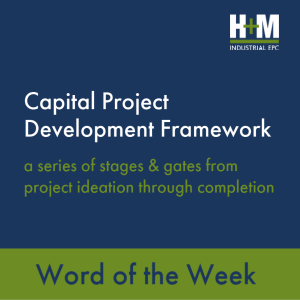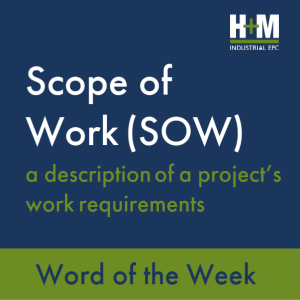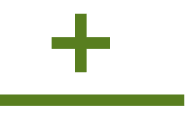Capital Project Word of the Week - Project Management
Thank you for visiting our Capital Project Word of the Week website feature. Our theme this month is Project Management. We hope this provides you with some meaningful information about our industry and the services we provide. Each week we will be adding a new Word of the Week to the page. Come back frequently to see our new additions!
Week of October 26, 2020
%2520(1).png)
Front End Planning (FEP)
[ fruhnt ] [ end ] [ plan-ing ]
Front End Planning (FEP) refers to the project development stages (phases) prior to the Owner’s Financial Investment Decision (FID) and the Detail Design and Construction phase. The purpose of FEP is to provide early project definition (scoping) and project execution planning to support capital cost estimates and project schedule development/timelines in order to confirm the project achieves the Owner’s business objectives (e.g. technical, operational, cost/ROI, schedule/time-to-market, etc.) before FID funding (full funding).
There are three (3) common stages in FEP: Concept, Feasibility, and FEED. These are utilized to varying degrees by Owners based on the project type, size, and other internal drivers. More details are included in the diagram below for reference.
Other names associated with Front End Planning include: Front End Loading (FEL), Front End Engineering & Design (FEED), Assess, Select, Define, Pre-Project Planning (PPP), Feasibility Analysis, Conceptual Planning

Word of the Week referrals will be entered into a monthly raffle. Every referral is an entry. Good luck and share on!
Subscribe to our newsletter below to get Word of the Week updates! Have a word suggestion? Send your suggestions to wow@hm-ec.com.
---
Week of October 19, 2020
Capital Project Development Framework

[ kap-i-tl ] [ proj-ekt ] [ dih-vel-uhp-muhnt ] [ freym-wurk ]
The Capital Project Development Framework is typically defined by a series of stages (phases) and gates (check points) from project ideation through completion. The purpose of the stage and gate process is to provide Owners, stakeholders, and project teams a structured method to check/confirm along the project development cycle that the project still meets the Owner’s business objectives (e.g. technical, operational, cost/ROI, schedule/time-to-market, etc) before the next capital expenditure and stage is authorized.
For example, if the Return on Investment (ROI) does not achieve the minimum “hurdle rate” in an Owner’s financial model at a particular gate then they may choose not to proceed with the project. The Owner’s financial model takes into account things like the capital cost of the project (CAPEX), operating costs (OPEX), market conditions/pricing for the product the project produces, and alike. Capital Project Development Frameworks can vary from Owner to Owner but a typical framework is included above for reference.
Other common industry terms include: Stage-Gate, Phase-Gate, Gate Review Process
Week of October 12, 2020
.png)
Request for Proposal (RFP)
[ ri-kwest ] [ fawr ] [ pruh-poh-zuhl ]
A Request for Proposal (RFP) refers to a document that an Owner issues to a Contractor requesting a formal proposal and price based on the Owner requirements contained in the RFP. The typical RFP contents provided by an Owner are a scope of work, technical requirements/specifications, drawing/document package, high level project schedule, terms and conditions, contract form (e.g. fixed price/lump sum, T&M/reimbursable, etc.) and instructions on what contents are to be included in the proposal from a technical and commercial standpoint by the Contractor.
Other common industry terms include: Invitation to Bid (ITB), Invitation to Tender (ITT)
Week of October 5, 2020

Scope of Work (SOW)
[ skohp ] [ uhv ] [ wurk ]
The Scope of Work (SOW) is a written description of the project which typically has two (2) parts, Scope of Facility and Scope of Services:
• Part 1: Scope of Facility (SOF) is a description of the physical plant and equipment to be designed and installed. This is a description of what is to be built.
• Part 2: Scope of Services (SOS) is a description of the engineering, procurement, and construction services to be provided. This typically includes a deliverables list which outlines the deliverables by discipline which will be produced in a particular project development phase (e.g. FEED/Detail Engineering/Construction).
A clear and defined SOW provides a common understanding and basis between the Owner and Contractor during the project execution.
Other common industry terms include: Project Scope, Statement of Work, Scope

The H+M Industrial Team
For over three decades, we have provided best-in-class capital project management services to Energy and Chemical industries through our proven EPC approach. We are dedicated to providing trust, experience, and efficiency through all stages of engineering, procurement, and construction--on budget and on time.

Partnering with H+M Modular
H+M Modular, a division of H+M Industrial EPC, specializes in custom fabricated equipment, modules, and skids for energy and chemical industries. The approach emphasizes the potential for decreased risk through more controlled fabrication, leading to enhanced quality and safety, reduced labor costs and construction times, improved labor availability, and solutions to geographic challenges. We are dedicated to providing trust, experience, and efficiency through all stages of traditional and modular construction projects using our proven EPFC approach, If you're considering modular fabrication, we invite you to connect with us to learn about how modular solutions can improve project outcomes.





